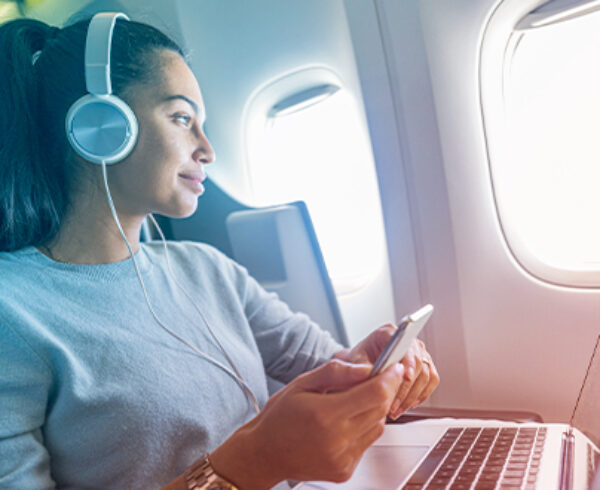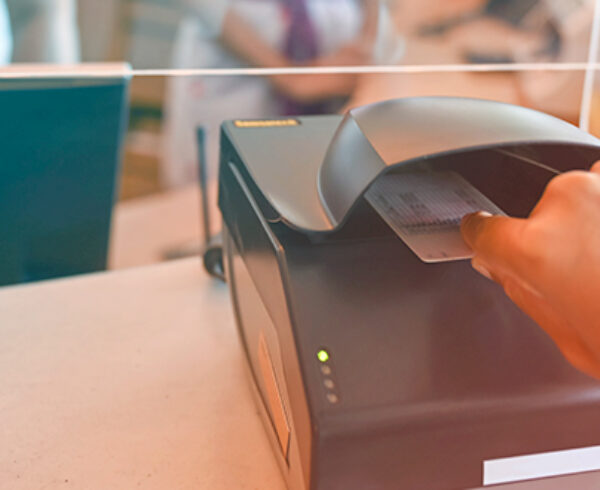Your personal information is at risk while traveling for work — which is why fraud prevention is so essential before, during and after your trip.
Fraud prevention is one of the most overlooked aspects of business travel, but there’s always a risk that someone could steal your documents to create a false identity. That’s why it’s important to keep your data and devices safe while traveling, whether you’re on a domestic itinerary or flying abroad for work.
Halloween is here, which means a time when false identities can be a lot of fun. But there’s nothing fun about false identities when they are created using your personal documents. Make sure no one creates a false identity using your data and information by following these 10 fraud prevention tips.
1. Book With Your Company’s Managed Travel Platform
Your company most likely uses a managed travel provider that offers an online booking platform. These platforms are helpful because they serve you a range of flight, hotel and car rental options that adhere to your company’s travel policy and that are pre-loaded with your loyalty information.
But another great reason to use a managed travel booking platform rather than booking directly with airlines and hotels: Your personal information remains a lot more safe and secure.
British Airways just recently experienced a hack that put at risk the personal information of many of its customers. Hackers are likely to be emboldened after this success, which means more attacks on other companies. When you use an online booking platform, you enjoy a barrier that prevents your information from being exposed should an airline or hotel provider get hacked.
2. Take Only the Documents and Data You Need
Go through your wallet and/or purse before your trip begins, and take out anything that isn’t absolutely necessary while you’re away from home. For example, you may carry around a checkbook and your social security card on a regular basis, but you aren’t likely to need those documents while you’re traveling for work.
The last thing you want is a pickpocket or other thief gaining access to important information included in your checkbook or on your social security card or other document.
3. Use the Hotel Room Safe
If you’re traveling internationally, you’ll need a passport and other similar travel documents. But make sure to keep these important documents as secure as possible while you’re in a distant city or country.
If the documents are not on your person, the best thing to do is use your hotel room safe. In most cities and countries, guests can trust room safes as secure places for locking up valuable and important documents that include personal information.
4. Create a Travel Email Address
Here’s an idea that’s often overlooked: Create an email address that you use only when traveling. Why? Because someone who gains access to a regularly used email account (like your work account) can access all sorts of personal and proprietary information.
So spend just a few minutes creating a Gmail account or another type of email account. Make this the account that you use when traveling away from the office — especially in a foreign country — and you’ll be able to keep your regular email accounts safe and secure.
5. Avoid Public Wi-Fi
Many public Wi-Fi networks aren’t secure. If you choose to use an unsecured public network, someone on the same network can gain access to your computer — including your emails, your browsing history and even your passwords.
If you must use a public Wi-Fi network, avoid logging into important email accounts, bank accounts or other sensitive sites and applications.
6. Clear History and Cookies on Public Computers
In a pinch, you might use a hotel’s business center or a computer at a café to check your email or browse the Internet while traveling. If you do so, make sure you clear all history and cookies before logging off.
Some public computers automatically log users out of email accounts and social media networks — but not all. By clearing the history and cookies, you ensure that the next user of the same computer can’t read your emails or access your Facebook account.
7. Never Lose Sight of Your Cell Phone
If someone gains access to your cell phone, they gain access to almost your entire world. Yes, most smartphones are now equipped with a number of security features that make it harder to access your information, but savvy criminals know how to get around those features.
Always protect your phone with a passcode. Log out of mobile apps when they aren’t in use, and consider deleting your most sensitive apps (like banking apps) until after your trip is complete. Also, just like on a laptop, avoid connecting your phone to any public Wi-Fi networks.
8. Beware of Vulnerable ATMs
Here in the United States, criminals sometimes place card readers at gas station terminals so that they can swipe your information. The same thing happens at ATMs in cities around the globe — most often at ATMs that are located outside of banks.
So, while traveling, avoid vulnerable ATMs in hotel lobbies and inside of stores, and opt instead for ATMs that are located inside banks where they cannot be tampered with.
9. Check Your Bank and Credit Card Statements
If someone does gain access to your personal information, you’ll want to know about it as soon as possible. That’s why it’s a good idea to check your bank and credit card statements regularly while you’re traveling. If you see a charge that shouldn’t be there, your bank or credit card provider needs to know about it as soon as possible. Also, consider notifying your bank and credit card companies before you travel — that will allow them to serve you quickly and effectively if something happens.
10. Switch Out PINs and Passcodes
If you want to be doubly safe about security and personal information, change important PINs and passcodes once you get home from a trip. If someone has gained access to your bank account or email address, a change of PIN or passcode can lock him or her out quickly.
Make the Most of Your Business Travel Experience
Fraud prevention is vitally important to stopping others from using your documents to create a false identity. But there’s so much to worry and think about when traveling for business — and using a travel company is the best and safest way to prevent fraud while also effectively managing all facets of business travel.
At JTB Business Travel, we are the comprehensive corporate travel agency that provides all the support, products and services that a company needs to make the most of their business travel experiences.
Get in touch to learn more about our services and our common sense approach to business travel.














Leave a Comment